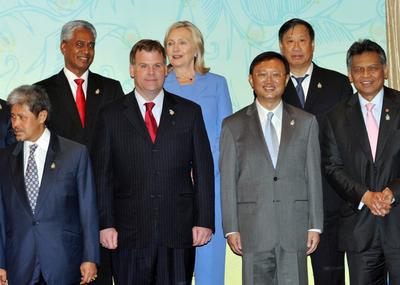Whether or not Indonesia is able to maintain this momentum in its international relations will depend largely on the extent to which it can manage three key domestic issues: democratic consolidation, the impact of internal nationalism on foreign policy and the Islamic dimension.
As a significant element of domestic political change since 1998, democracy inevitably figures as a central element of Indonesia’s foreign policy. There is widespread public support — especially among academics, activists, NGOs and parliamentarians — for the inclusion of democratic values and a democracy-projection agenda into foreign policy. Such support and encouragement is strongly reflected in the nation’s stance on the ASEAN Charter, the promotion and protection of human rights in ASEAN, and Myanmar. Many Indonesian parliamentarians, such as Eva Sundari of the Indonesian Democratic Party-Struggle, believe the Indonesian government should have supported the US proposal for a UN commission to investigate alleged crimes against humanity in Myanmar. Another parliamentarian, Budiman Sudjatmiko, even believes that ‘Indonesia needs to encourage ASEAN to evaluate Myanmar’s membership in ASEAN’. But critics often point out that Indonesia must still prove its own democratic credentials before projecting such values abroad. Persistent problems of corruption, terrorism, communal tensions and weak law enforcement all complicate efforts at influencing the political course of neighbouring countries.
This said, Indonesia’s democratisation has affected foreign policy formation by replacing the old, highly-centralised authoritarian structure with a more pluralistic and competitive policy making milieu. Foreign policy is no longer the exclusive domain of a few elites; it must now be formulated within complex power structures where the role of public opinion and non-governmental actors has increasingly become pivotal. But with foreign policy more open to the public, in some ways it is now more difficult for Indonesia to forge closer relationships with other nations.. It has been noted, for example, that ‘democratisation has provided new opportunities for … US opponents to influence Indonesian foreign policy, making it costly for Indonesian leaders to cooperate with the United States’.
This last example hints at the impact of domestic nationalism on Indonesia’s foreign policy. Nationalism has been at the heart of Indonesia’s politics and foreign policy since independence; only now, its expression is no longer controlled by an authoritarian government and is thus being injected into foreign policy by many actors, in many forms and for different purposes. Perhaps the most striking manifestations of this is Indonesia’s acute sensitivity to the question of territorial integrity and the preservation of the country’s political and economic autonomy in the international arena. Segments of Indonesia’s elite and general public still harbour the view that major powers — especially the US — will try to subjugate Indonesia by keeping the country economically weak and politically divided. Despite obvious humanitarian purposes, for example, Indonesia was initially wary of American and other foreign troops’ presence in tsunami-hit Aceh, and remains suspicious of Australia’s policy toward Papua. The recurring emotional expression of nationalism over the issue of overlapping territorial claims with Malaysia has also puzzled many of Indonesia’s regional partners.
Nationalist sentiment is also seemingly expressed in a growing anti-foreign attitude, especially by politicians. It has even become difficult for the government to provide favourable business terms to attract foreign investors without the risk of being accused of selling the country to foreigners. More recently, Indonesia’s parliamentary leaders backed the government’s plan to evaluate and ‘discipline’ foreign and foreign-funded NGOs operating in Indonesia, for fear that outside assistance would compromise the integrity and independence of NGOs and ‘provide an opportunity for foreign parties to intervene [in Indonesia’s internal affairs] and advance their own interests in Indonesia’. But while this might look like anti-foreign sentiment on the rise, it merely reflects Indonesia’s aspiration to self-reliance and desire to deny any opportunity for foreign countries to reap unfair advantages at the expense of Indonesia’s own interests.
A final variable in Indonesia’s foreign policy is Islam, which figures prominently due to its self-promotion as a moderate Muslim country. By defining Indonesia’s Islam as a force for peace, tolerance and harmony, Indonesia’s government seeks to articulate its brand of Islam as a moderating voice between the Muslim world and the rest, and within the Muslim world itself. In order to project such an image, Indonesia’s Ministry of Foreign Affairs embarked upon a series of initiatives by which it sought to incorporate Islam into foreign policy. For example, Indonesia tried to play a mediating role in conflicts in the Muslim world by hosting the Sunni-Shiite Conference in Bogor to help foster dialogue and peace between the two factions of Islam in Iraq. Similarly, Indonesia participated in the UN Peacekeeping mission in Lebanon.
The entrance of Islam into Indonesia’s foreign policy now necessitates a delicate balancing act, as segments of the Muslim community have demanded that Indonesia identify itself with the Arab-Muslim world. When the government voted in favour of the UNSC Resolution No. 1747 in order address the issue of non-proliferation, domestic constituents understood the vote — which sanctioned Iran — as a betrayal of another Muslim country. But despite Islam’s growing importance in Indonesia’s domestic politics, its influence on foreign policy should not be exaggerated. Indonesia has never expressed its foreign policy in terms of co-religionist solidarity and its policy toward international Islamic issues remains governed by the principle of non-interference. Rather, Indonesia’s aspiration to become a global player has been expressed clearly in its desire to play a role as a ‘problem-solver’ and a ‘bridge-builder’ at the international level. It remains to be seen whether it has the ability to translate this global aspiration into the actual conduct of foreign policy and effect serious change on the global stage.
Dr Rizal Sukma is Executive Director at the Centre for Strategic and International Studies, Jakarta.

